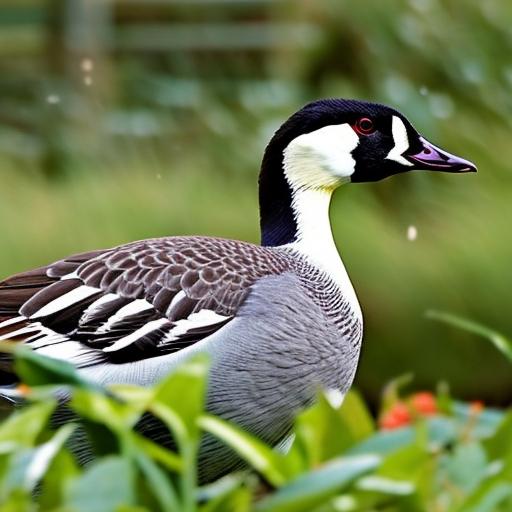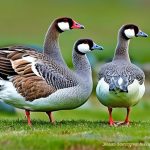Canadian geese are a common sight in many parts of North America, including Canada and the United States. While these birds may be beautiful to look at, they can also cause significant problems, especially when they take up residence on lawns. The issue of Canadian geese on lawns has become a growing concern for many homeowners and property owners. It is important to address this problem because the presence of geese can lead to damage to lawns and pose health risks to humans.
Key Takeaways
- Canadian Geese are a common problem for homeowners with lawns in Canada.
- Geese are attracted to lawns because they provide easy access to food and water.
- Geese can cause damage to lawns through their droppings and constant grazing.
- Keeping geese off your lawn is important to maintain its health and appearance.
- Natural methods, physical barriers, repellents, scare tactics, and professional services can all be effective in keeping geese away from your lawn.
Why are Canadian Geese attracted to lawns?
To understand why Canadian geese are attracted to lawns, it is important to understand their behavior. Canadian geese are social animals that often travel in large flocks. They are also herbivores, meaning they primarily eat plant material. Lawns provide an ideal habitat for geese because they offer a source of food, water, and shelter.
There are several factors that attract geese to lawns. One of the main reasons is the availability of food. Lawns often have short grass that is easy for geese to graze on. Additionally, lawns near bodies of water, such as ponds or lakes, are particularly attractive to geese because they provide a source of water and a place for the birds to rest.
The Negative Effects of Canadian Geese on Lawns
The presence of Canadian geese on lawns can have several negative effects. One of the most obvious is the damage they can cause to the grass. Geese have a tendency to graze heavily on lawns, which can result in patches of bare soil and damaged grass. This can make lawns look unsightly and can be costly to repair.
Another negative effect of geese on lawns is the health risks associated with their droppings. Geese droppings can contain harmful bacteria such as E. coli and Salmonella, which can pose a risk to humans, especially if they come into contact with the droppings or if the droppings contaminate water sources. In addition, the droppings can also create an unpleasant odor and attract other pests such as flies.
The Importance of Keeping Geese off Your Lawn
Maintaining a goose-free lawn is important for several reasons. Firstly, it helps to prevent damage to the grass and maintain the overall appearance of the lawn. Geese can cause significant damage to lawns, which can be costly and time-consuming to repair. By keeping geese off your lawn, you can preserve its beauty and ensure that it remains a pleasant space for you and your family to enjoy.
Secondly, keeping geese off your lawn is important for health reasons. As mentioned earlier, geese droppings can contain harmful bacteria that can pose a risk to humans. By preventing geese from taking up residence on your lawn, you can reduce the risk of exposure to these bacteria and protect the health of yourself and your family.
Natural Ways to Keep Canadian Geese off Your Lawn
There are several natural ways to deter Canadian geese from your lawn. One effective method is to use plants and landscaping features that are unattractive to geese. For example, planting tall grasses or shrubs around the perimeter of your lawn can create a barrier that makes it difficult for geese to access the grass. Additionally, using plants that geese do not like to eat, such as yarrow or lavender, can also help to deter them.
Creating an uninviting environment for geese is another natural way to keep them off your lawn. Geese prefer open spaces where they have a clear view of their surroundings. By adding obstacles such as rocks or decorative fencing to your lawn, you can make it less appealing to geese. Additionally, using motion-activated sprinklers or noise-making devices can startle geese and discourage them from staying on your lawn.
Physical Barriers to Keep Geese Away from Your Lawn

Installing physical barriers is another effective way to keep geese away from your lawn. Fencing and netting can be used to create a physical barrier that prevents geese from accessing your lawn. Fencing should be at least three feet high and have small gaps to prevent geese from squeezing through. Netting can be installed over ponds or other bodies of water to prevent geese from landing and accessing your lawn.
Using decoys and scarecrows is another physical barrier method that can be effective in deterring geese. Geese are social animals and are often wary of unfamiliar objects or animals. By placing decoys or scarecrows in your yard, you can create the illusion of a predator presence, which can deter geese from landing on your lawn.
Repellents to Deter Canadian Geese from Your Lawn
There are several types of repellents available that can help deter Canadian geese from your lawn. One type of repellent is a taste deterrent, which is applied to the grass and makes it unpalatable for geese. These repellents are typically made from natural ingredients such as grape extract or garlic oil and are safe for humans, pets, and the environment.
Another type of repellent is a visual deterrent, which uses reflective materials or bright colors to scare geese away. These deterrents work by creating an optical illusion that makes it appear as though there is movement or danger present. Visual deterrents can be in the form of flags, balloons, or tape that is hung around the perimeter of your lawn.
The Role of Scare Tactics in Keeping Geese off Your Lawn
Scare tactics can be an effective way to keep geese off your lawn. There are several different scare tactics that can be used, including noise-making devices, such as air horns or whistles, and motion-activated devices, such as sprinklers or lights. These scare tactics work by startling geese and making them feel threatened, which encourages them to leave the area.
However, it is important to note that scare tactics may not be effective in the long term. Geese are intelligent animals and can quickly become accustomed to scare tactics if they are not consistently enforced. Therefore, it is important to use scare tactics in conjunction with other methods, such as physical barriers or repellents, to ensure long-term success in keeping geese off your lawn.
Professional Services to Keep Canadian Geese off Your Lawn
If you are unable to effectively deter geese from your lawn using natural methods or if the problem persists, you may want to consider hiring professional services. There are companies that specialize in geese control and offer a range of services to help keep geese off your lawn. These services may include the installation of physical barriers, the use of repellents, or the implementation of scare tactics.
When considering professional services, it is important to take into account the cost. The cost of professional services can vary depending on the size of your lawn and the extent of the geese problem. It is recommended to get quotes from multiple companies and compare their services and prices before making a decision.
Maintaining a Goose-Free Lawn
In conclusion, addressing the issue of Canadian geese on lawns is important for several reasons. Geese can cause damage to lawns and pose health risks to humans through their droppings. By keeping geese off your lawn, you can prevent damage and maintain a healthy environment for yourself and your family.
There are several methods available to keep geese off your lawn, including natural deterrents, physical barriers, repellents, and scare tactics. It is important to choose a method or combination of methods that works best for your specific situation. If natural methods are not effective, professional services may be a viable option.
By taking action to prevent geese from taking up residence on your lawn, you can ensure that your lawn remains a beautiful and safe space for you and your family to enjoy.
If you’re looking for effective ways to keep Canadian geese off your lawn, you might find this article on Poultry Wizard quite helpful. It provides valuable insights and tips on how to deter these birds from invading your property. From understanding their behavior to implementing practical solutions, this article offers a comprehensive guide to keeping your lawn goose-free. Check it out here for more information.
FAQs
What are Canadian geese?
Canadian geese are a species of waterfowl that are native to North America. They are known for their distinctive black heads and necks, white cheeks, and brown bodies.
Why do Canadian geese come onto lawns?
Canadian geese are attracted to lawns because they provide a source of food and water. They will often graze on grass and other vegetation, and may also drink from ponds or other bodies of water on the property.
What problems can Canadian geese cause on lawns?
Canadian geese can cause a number of problems on lawns, including damage to grass and other vegetation, accumulation of droppings, and aggressive behavior towards humans and pets.
How can I keep Canadian geese off my lawn?
There are a number of strategies that can be used to keep Canadian geese off your lawn, including installing physical barriers, using repellents, and modifying the landscape to make it less attractive to geese.
Are there any humane ways to keep Canadian geese off my lawn?
Yes, there are several humane ways to keep Canadian geese off your lawn, including using noise-making devices, planting vegetation that geese do not like, and using motion-activated sprinklers.
Is it legal to harm or kill Canadian geese?
No, it is illegal to harm or kill Canadian geese without a permit from the appropriate wildlife agency. Canadian geese are protected under the Migratory Bird Treaty Act, which makes it illegal to harm or kill them without a permit.
Meet Walter, the feathered-friend fanatic of Florida! Nestled in the sunshine state, Walter struts through life with his feathered companions, clucking his way to happiness. With a coop that’s fancier than a five-star hotel, he’s the Don Juan of the chicken world. When he’s not teaching his hens to do the cha-cha, you’ll find him in a heated debate with his prized rooster, Sir Clucks-a-Lot. Walter’s poultry passion is no yolk; he’s the sunny-side-up guy you never knew you needed in your flock of friends!







